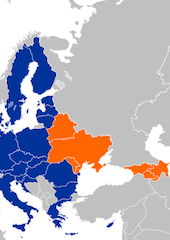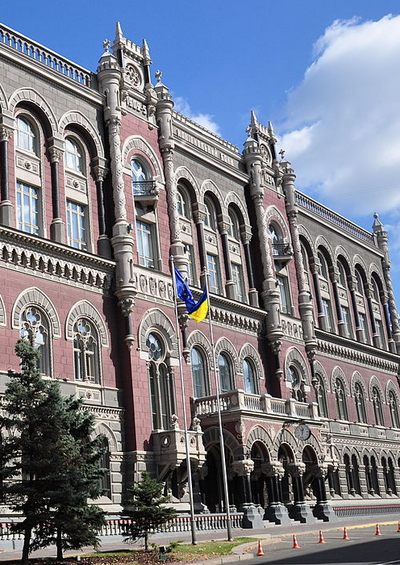The European Union as a Foreign Policy Weakling
Does the EU lack the will to deal with its eastern “partners” at Riga?
May 21, 2015

It used to be said about NATO that it was designed to keep the Russians out, the Americans in and the Germans down.
In a similar vein, the EU’s foreign policy vis-à-vis its unhappy neighbors consists of giving Russia too much say, while the Balkan and other non-EU Eastern European nations are offered an unfortunate mix of too little hope, too many lectures and not enough solidarity.
As a result, the hopes that the European Union would transform non-EU European states into functioning market economy democracies appear to be hollow.
And once again, the EU seems unable to stop Russia from being the tail that wags the EU foreign policy dog in the near neighborhood that Russia and the EU share.
Given the weight of history, all of this is unfortunate. It has been 20 years since the Katyn-style massacre in Srebrenica, when 8,000 European Muslims were taken out by Serbs and slaughtered in cold blood.
But the state of Bosnia-Herzegovina is no closer to Europe today than when its young men were killed by Serb war criminals, few of whom have ever answered for their acts.
Four hundred miles further south in Macedonia, deadly violence has erupted, as Macedonian politics is conducted in a way that guarantees conflict and no sense of alternating parties in power.
Meanwhile, the EU has all but given up on twisting arms, offering inducements or even getting all its own member states to do simple things like recognize Kosovo and Macedonia.
The EU plus Six (really Seven) at Riga
At the May 21-22 EU Summit in Riga, EU officials will try to show that Europe can change its eastern neighbors for the better. Six countries – Armenia, Azerbaijan, Belarus, Georgia, Moldova and Ukraine — will sit down with the EU to draw up a summit declaration.
The eighth participant in the Riga summit is Russia. It has not been invited and does not have its flag at the table. However, through its client state, Armenia, the Kremlin will seek to influence the summit.
This influence will primarily occur through the positions taken on Azerbaijan, where Armenia occupies part of Azeri sovereign territory — in defiance of both the UN and the Council of Europe. The case is similar to Russia now occupying a chunk of Ukraine via Crimea.
The inability of the EU to shape a policy to deal with Russian aggression in Ukraine has left the Russians feeling cocky and on a roll.
Russia has a plan
The Russian foreign minister, Sergei Lavrov, has just visited Belgrade in an effort to shore up Serb nationalist positions on Kosovo and present Russia as the region’s friend.
Lavrov’s bigger point, of course, is that Russia has a plan — in contrast to the EU, which is unable to offer effective solutions, such as were found to allow Croatia and Slovenia to enter the EU. Russia does not intend to leave other post-Yugoslav states in limbo.
Russia is central to the EU’s inability to develop a relationship with its eastern neighbors.
The Kremlin is engaged in a variety of maneuvers — military support of Armenian irredentism in Azerbaijan, destabilizing Moldova with its troops in the breakaway Moldovan frontier region of Transnistria, and all but annexing outright the Georgian regions of Abkhazia and South Ossetia.
Ukraine remains the biggest headache. Russia skillfully keeps tensions aflame, with a carefully stage-managed sending of troops and arms to separatists. Russian support in Eastern Ukraine is calibrated to ensure permanent destabilization of Kiev, but is not so crude as to produce a firm and united EU response.
Washington tilts and the EU fumbles
Washington’s tilt away from Europe under Obama has placed responsibility on the EU to sort out its backyard. However, despite grandiose claims to a European foreign policy, the nation states of the EU, as well as Brussels itself, cannot get their act together.
There are demands that the six eastern partnership states clean up their democracies and raise human rights standards.
Human Rights Watch has just cited Armenia for detaining opposition activists who wanted to stage a peaceful demonstration about lack of freedom in Armenia.
Meanwhile, Georgia is demanding that Ukraine hand over former Georgian president Misha Saakashvili, who put his country on the global map after tackling corruption and growing the economy.
Saakashvili is now an advisor on economic and institutional reform to Ukrainian President Petro Poroshenko. The former Georgian leader is Putin’s International Public Enemy Number One and few doubt his fate if Kiev handed him over.
True, ballot box and media freedoms are not much in evidence in Belarus and Azerbaijan. But is the EU’s inclination to treat their governments as perpetual pariahs or political lepers an effective policy?
In short, Europe has no offer, even in modest areas like visa liberalization, student scholarships, or trade and transport contacts that can turn the hopes of an effective EU Eastern Partnership policy into delivered reality.
A year after the new EU Commission arrived in office, its foreign policy successes are meager.
Takeaways
A year after the new EU Commission arrived in office, its foreign policy successes are meager.
The EU offers Balkan and non-EU Eastern European nations a mix of little hope, little solidarity and many lectures.
The EU’s inability to shape a policy to deal with Russian aggression in Ukraine has left the Russians feeling cocky.
Russia calibrates its support in Eastern Ukraine to destabilize Kiev but not to produce a firm EU response.
Washington’s tilt away from Europe under Obama has placed responsibility on the EU to sort out its backyard.

